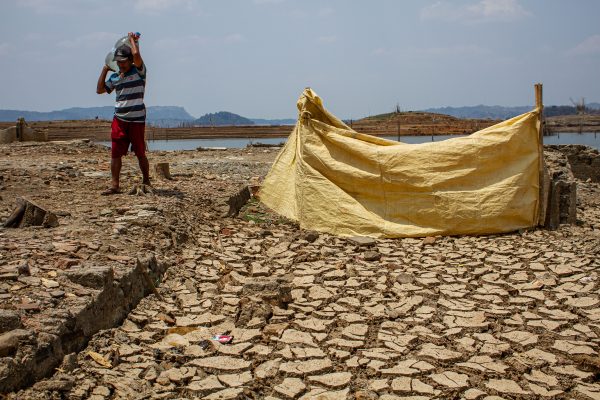There has been a surge in severe fires across the country. In the past, uncontrolled burning has led to toxic haze covering not only Indonesia but also neighbouring Malaysia, Singapore and as far as southern Thailand. The fires in 2015 were estimated to cost US$16.1 billion in losses, while the 2019 fires caused economic losses of US$5.2 billion.
Flooding is another serious concern, particularly in low-lying areas with limited water absorption capacity. Air pollution is also a growing issue, especially in Indonesia’s urban centres. The proliferation of motor vehicles in cities has resulted in increased emissions of exhaust gases and particulates, while industrial combustion has produced secondary pollutants. These pollutants cause deteriorating air quality and public health problems. Data shows that concentrations of fine particulate matter often exceed recommended safety thresholds set by the World Health Organization, particularly in densely populated metropolises. Air pollution has caused 8100 deaths and US$2.1 billion worth of damage in Jakarta so far in 2023.
Politicians in both the legislative and executive branches hold strategic positions within Indonesia’s environmental governance framework, with the authority to formulate regulations and allocate state resources to address environmental challenges.
Lawmakers in the House of Representatives have the power to enact environmental policies, programs and budgets, while the president, governor and regent use executive influence to translate legislative plans into tangible actions on the ground. Their oversight functions, including expenditure tracking, monitoring, transparency and accountability, are essential to ensure proper resource utilisation for environmental protection.
These politicians have the potential to initiate the systemic changes necessary for environmental management through their access to legislative and regulatory institutions. But they face myriad challenges. Corruption and a lack of transparency in natural resource extraction can divert vital funds from crucial environmental management efforts. The pressures of abbreviated political tenures and relentless attempts at re-election often incentivise ephemeral fixes that jeopardise enduring, sustainable solutions.
Overlapping jurisdictions between central, provincial and regional governments can engender confusion and obstruct environmental policy implementation. The influence of business interests in extractive industries can precipitate lobbying efforts that oppose stringent environmental regulations and hinder the transition to environmentally responsible practices.
Indonesia’s complex multi-party democracy presents challenges to building consensus on sustainability issues. With parties representing diverse regional, religious and ideological interests, it can be difficult to align on national environmental priorities. This fragmentation enables rent-seeking behaviour around natural resources that parties leverage for political financing and patronage.
The participation and leadership of political stakeholders is crucial for prioritising environmental management. Elected representatives and appointed technocrats have the ability to integrate science-based sustainability principles into Indonesia’s development agenda. With a combination of legislative authority, executive direction, funding priors, modernised institutions, expert consultation and public engagement, officials can pragmatically transition towards science-based sustainability.
Their oversight across various sectors can drive the systemic changes needed to reduce emissions, protect ecosystems and promote green innovations. But achieving this transformation requires political leaders to transcend short-term electoral cycles and partisan interests.
With intentional reforms to electoral rules, campaign finance laws, voter education, institutional design and expert empowerment, Indonesian political leaders can prioritise long-term, evidence-based sustainability despite short-term partisan interests. Specific strategies should include instituting longer-term limits to incentivise farsighted thinking beyond the next election cycle.
Building multiparty coalitions around sustainability can make it a nonpartisan priority. Enacting anti-corruption reforms like transparency, accountability and curbing special interest lobbying would reduce partisan influences. Shifting campaign financing away from corporations towards public funding and donation caps would limit special interests. Investing in environmental education programs can build grassroots voter demand for sustainability across party lines. Emphasising how sustainability leads to lasting prosperity keeps voters satisfied across political cycles.
Politicians should highlight sustainability issues that resonate across party lines — including public health impacts of pollution, disaster resilience and economic diversification. Building grassroots voter demand for sustainability can pressure parties to elevate the issue above partisan differences. During periods of single-party dominance, the majority should institutionalise long-term environmental management frameworks that successive governments would struggle to reverse.
Political leaders should engage diverse stakeholder groups beyond just businesses. Environmental groups, academics, religious organisations, socio-cultural institutions and youth representatives can offer valuable insights for nuanced policymaking. Incorporating local knowledge and priorities into environmental management frameworks enhances cultural relevance while building public trust and compliance.
Simultaneously, lawmakers play a pivotal role in promoting investments in research and the development of green technologies. By directing resources towards renewable energy, waste recycling innovations, clean transportation and climate-smart agriculture, politicians can drive Indonesia’s transition to a circular green economy.
As Indonesia’s 2024 general elections approach, it is essential for public discourse to emphasise the importance of environmental sustainability. Voters must choose representatives committed to ecological integrity, social welfare and long-term sustainability over short-term interests.
Indonesian citizens hold the power to shape the nation’s ecological future. It is their democratic duty to elect leaders who are willing to safeguard the environment.
Mohammad Yunus is pursuing a Master of Science in Biological Science at Khon Kaen University, Thailand.

